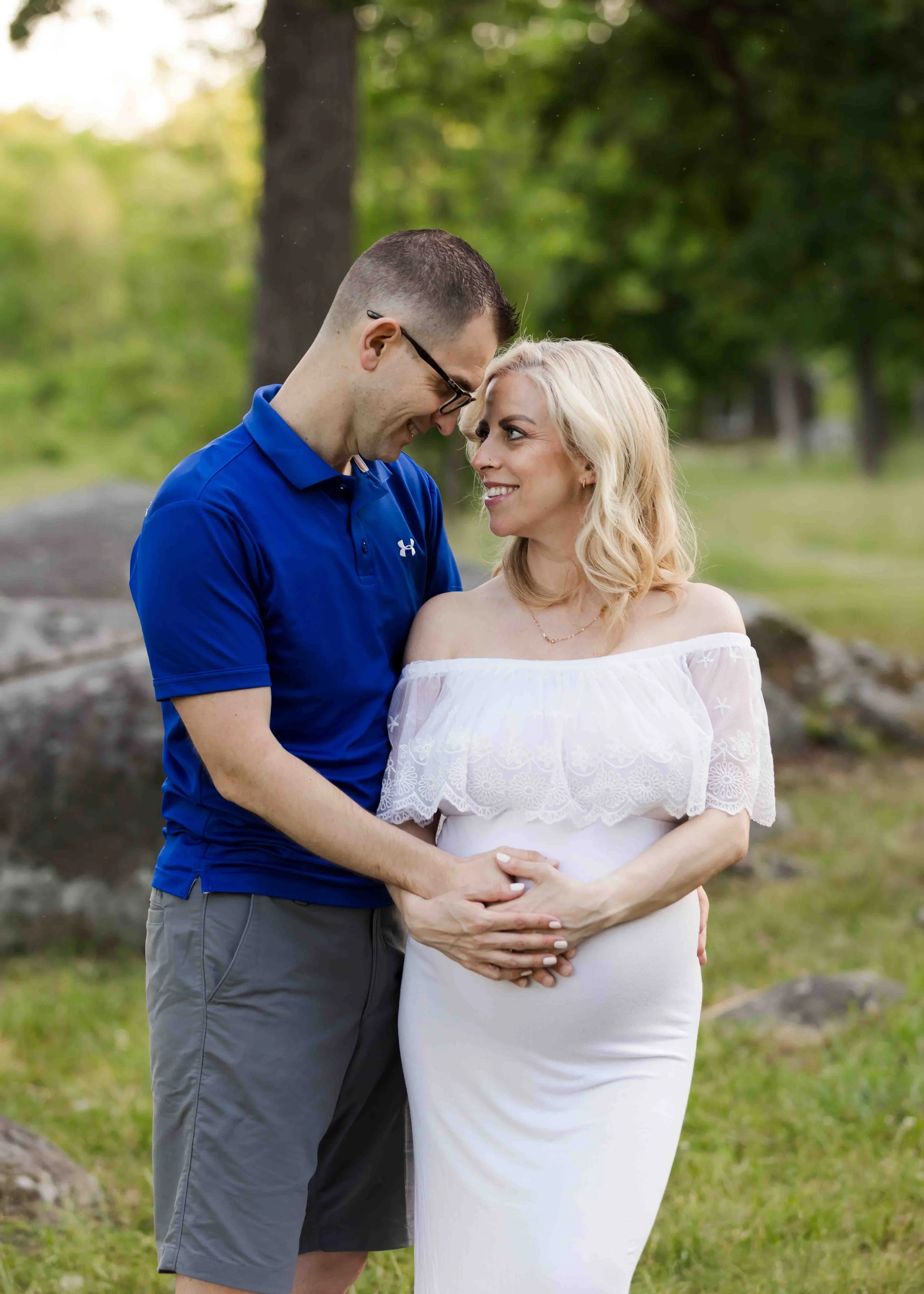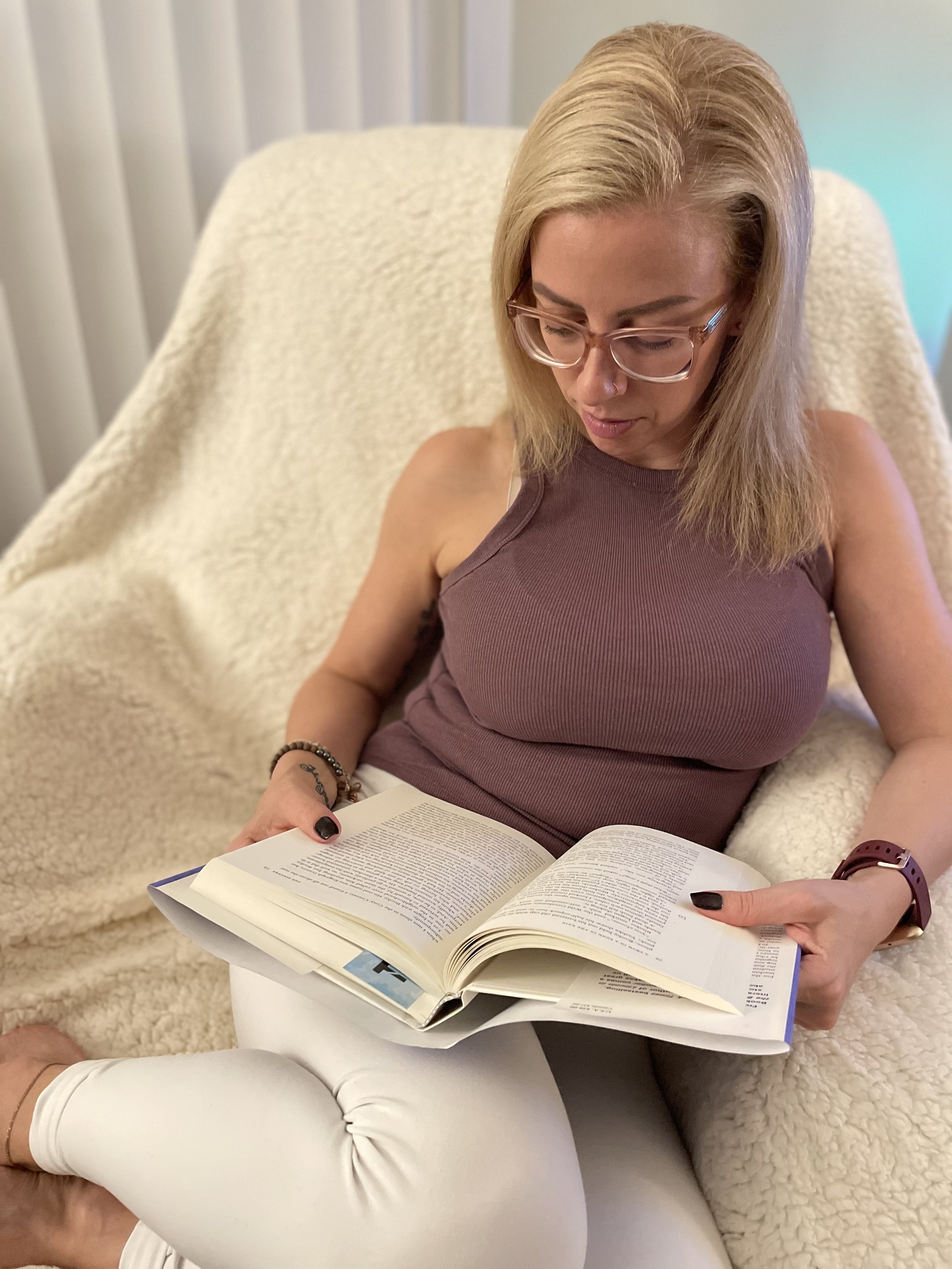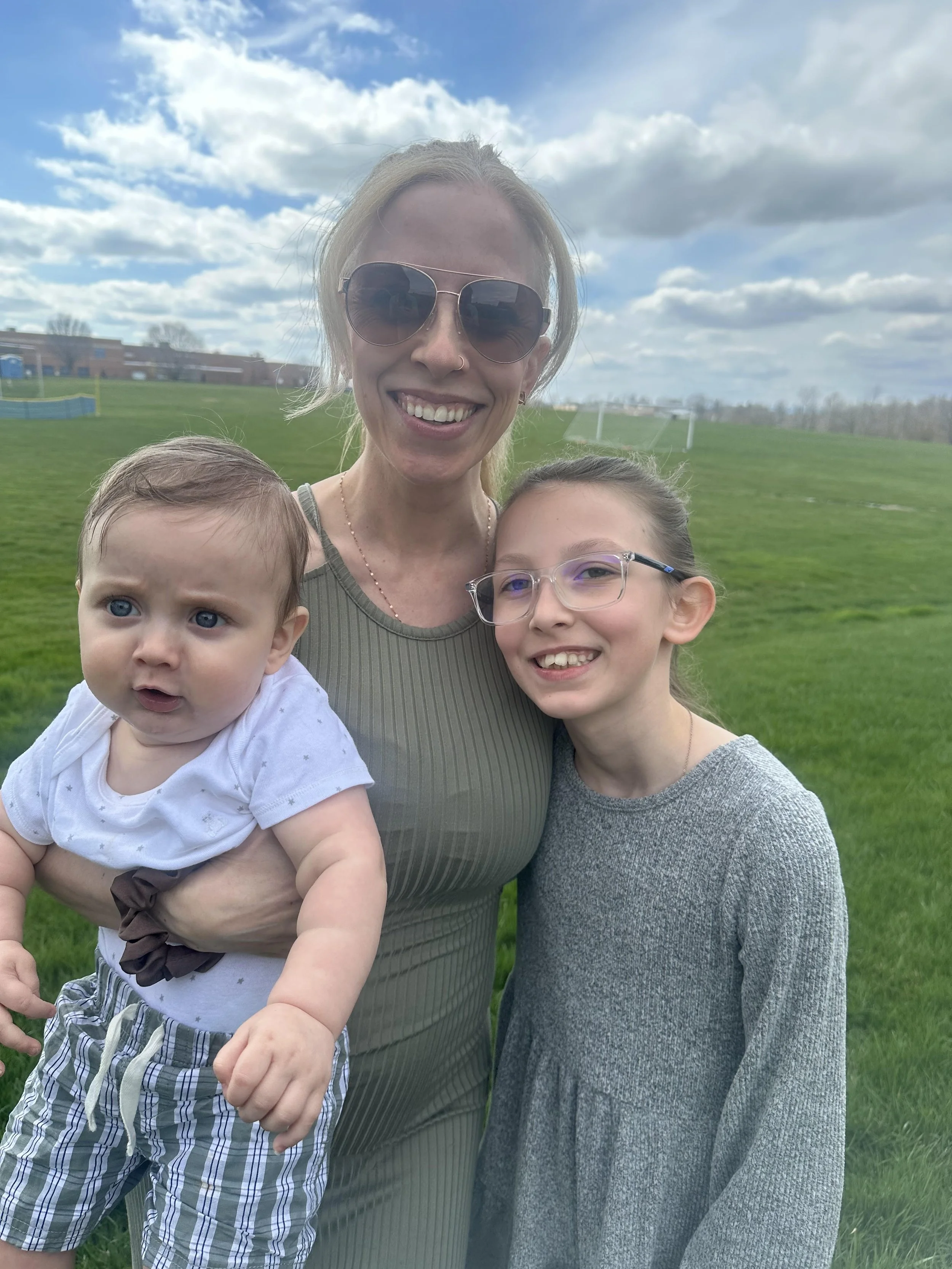An Interview with Kezia Calvert
Welcome back to TUL’s guest blog series, featured every Friday! This week, get ready for a special edition as we dive into an exclusive interview with the incomparable Kezia Calvert.
If you've delved into the online ‘Sober Insta’ community, you've likely encountered the inspiring presence of Kezia Calvert, also known as The Sober Elephant Chronicles.
Several years ago, Kezia and I connected in this space, finding common ground as Canadians navigating the journey of alcohol-free living. Her vibrant spirit and generous sharing of her writing, knowledge, and workshops have been a pillar of support for many. Kezia's heart of gold shines through her story, which resonates deeply.
Kezia Calvert's journey through sobriety and motherhood epitomizes the remarkable transformation that arises from resilience and self-discovery. From her roots in Edmonton, Alberta, to her time overseas, and the profound experience of motherhood, Kezia's narrative is a testament to finding purpose and joy in life.
In this intimate interview, she graciously shares her insights on her path to sobriety, her personal experiences with ADHD, the profound impact of motherhood, and the nurturing community she has cultivated through her workshops and writing.
(Note: Interview responses have been edited for brevity and clarity.)
Can you share a bit about your background and what led you to give up alcohol completely?
Growing up, alcoholism wasn't part of my family dynamic; my parents drank moderately on special occasions. While some of my uncles struggled with addiction, it wasn't something I understood well. Despite this, I always felt like the odd one out growing up in Edmonton, AB.
After high school, I eagerly embraced a move to England with a guy I met at my call center job. Living overseas for seven years, my drinking became problematic. I was the fastest drinker and the drunkest in the room. Yet, since everyone was drinking, it felt like I fit right in. Alcohol became a crutch. I didn’t know who I was outside of that relationship. I didn’t like myself. Who am I? What happened here?
Eventually, my grandfather became sick, and I returned to Canada around the same time my relationship was ending. We sold the house in England - it was messy.
Back in Edmonton, I landed a lucrative recruitment job that fueled my partying, often leading to blackout nights. My job eventually came to an acrimonious end. I knew I had to leave, and when my friend was going to Australia, I joined her a few days later. My cousin from the UK had also just moved there.
But the same habits returned - hooking up with people in relationships, partying so hard, and suffering bad hangovers - yet, I never considered alcohol a problem. I thought I was letting loose and having fun.
Returning to Canada, I moved to Kelowna, where I met my daughter’s father. I was partying and working in the bar scene. It was a dark time. After a year and a half, we had to run as he started dealing drugs. We eventually ended up in Ontario in his mother’s basement. It was a mentally abusive relationship that I felt trapped in, and he isolated me from everyone. I got pregnant, and though he didn’t want to go through with it, I did, and now I have my daughter, Harper.
I left him when she was 10 months old.
Despite the challenges, my daughter brought so much light into my life. Meeting my husband in June 2018 marked a turning point, and his proposal in April 2019 solidified our bond.
I quit drinking in November 2020 and have been happily residing in Pennsylvania with my family since December 2020.
How has sobriety impacted your journey through motherhood?
Sobriety has been transformative in my experience of motherhood.
I quit drinking when my daughter, Harper, was 6, so she still remembers some things. Motherhood, at its best, can be extremely lonely and isolating, especially while working for myself at home. There are many “reasons” I could find to want to numb or escape.
When I found out I was pregnant with my son, Tristan, I saw it as an opportunity to fully embrace sobriety. Being present for my children, free from the haze of alcohol, has allowed me to navigate the highs and lows of motherhood with clarity and authenticity.
I notice so much more when I’m not drinking - Tristan’s expressions, the little arm flaps. Sometimes I feel guilt and shame that I wasn’t in this place during Harper’s life. But I’ve had the opportunity to do things differently, and now I’m part of a unit, not an island.
It’s been a privilege to experience all the emotional rollercoasters throughout pregnancy and in the last year.
Tell us about your workshops and writing journey during your recovery.
During the pandemic, I initiated writing workshops to foster connection and share my journey of recovery. These sessions, emphasizing healing and self-expression, have evolved into a supportive community. Initially free due to visa constraints, I advertised on Eventbrite, attracting participants globally. Establishing an LLC, I now host women's workshops weekly, maintaining an intimate group size to ensure a safe, supportive environment.
Sessions typically begin with meditation before delving into writing prompts, allowing participants to share at their comfort level. Recovery is a prominent theme in my story, guiding our discussions. I also lead co-ed workshops on Sundays and collaborate with other women's communities.
Writing has been a consistent passion, from Medium to Substack, which I revisited during pregnancy. My writing explores motherhood, womanhood, menopause, and recovery. With a handful of subscribers, including my mom, it feels like nurturing a garden, planting seeds of connection. As my writing journey progresses, I'm thrilled to engage with others and share new essays on these themes.
What role does self-compassion play in your journey of healing from past experiences?
Revisiting old locations where I drank, I feel the presence of the girl that I was then and how much I just want to hold her and say it’s okay what happened, I know that there’s shame attached. Look at us now. We’re okay. I was carrying so much. I share a lot of my story on Instagram, and the connections are some of the most meaningful. We [Kezia and Hayley] met on there!
I care about how I feel, but it doesn’t matter what I look like to other people. I cared so much about exterior things and appearances in active addiction, but I wouldn’t trade it for anything. It is hard, though, because I’m neurodivergent and have ADHD, so I work on letting things go.
Could you elaborate on your experience with neurodivergence and ADHD, and how it has influenced your life?
Growing up, I struggled with time management, focus and attention, anxiety, executive functioning, and interpersonal relationships. Masking became my coping mechanism for getting through my day-to-day challenges. "Masking is the act of intentionally or unintentionally hiding aspects of oneself to avoid harm." One of the things I heard most growing up was how much potential I had if only I could apply myself. It felt like a shot through my heart every time I heard this. I felt like I wouldn't be accepted or loved for who I was, which led to years of people-pleasing and being a chameleon depending on who I was with and what I was doing. It eventually also led me to drink and use other substances to quiet the noise in my head. Drinking and using provided temporary relief and an escape from the reality of my neurodivergence. The older I got, the more my brain got in the way of me achieving my goals, but unfortunately, I had no idea that I was living with undiagnosed ADHD. In fact, I'd never even heard of neurodivergence or ADHD. The extent of my knowledge was around hyperactive little boys being prescribed Ritalin to help them focus in school. No one ever talked about how ADD could manifest in girls. In early adulthood, I noticed I lacked impulse control around spending, I was constantly in debt, and yet still continued to spend well beyond my means. I also had trouble holding down a job for longer than a year. I would get bored and mentally check out or start daydreaming. This continued well into my thirties and brought with it a ton of shame.
When I finally got sober in November 2020, I was no longer able to hide behind the mask of drinking. Everything I'd struggled with growing up came back up to the surface. I can't recall exactly how I discovered ADHD, but once I did, I went down a rabbit hole of researching everything there is to know about my condition. I reached out to other neurodivergent women, I wrote about my experiences, and I sat in the discomfort of not feeling like I belonged anywhere.
After building a successful presence in the sober Instagram community, I am now in the process of building a new community on Substack. This pivot moves me towards neurodivergent women in recovery. The more I discover about my neurodivergence, the more I want to help other women who are struggling to love and accept themselves through alcoholism, substance abuse, sexual abuse, mental illness, and other incredibly heart-wrenching experiences. Our community offers zoom meetings, guest speakers, coworking/body double sessions, weekly memoir-style essays that encapsulate my personal experience with neurodivergence, and so much more! Neurodivergence doesn't have to be a curse; it can be one of the most powerful gifts you'll ever receive. Some of the most creative, inspiring, compassionate humans I know are neurodivergent. There is no "one size fits all" solution for managing life with ADHD.
Do you have advice for readers who may be struggling with ADHD?
My best advice is to start exposing yourself to the ADHD world. Whether it's following creators on social media, reading books, listening to podcasts, or reaching out to women you admire, just find a place to grow roots and start to blossom in your unique beauty! I'm still learning ways of coping with things like feeling overwhelmed and time blindness. "Time blindness is the inability to recognize the passage of time, or the difficulty in managing time." Some days are better than others, but life is one hundred percent more manageable when I'm not drinking!
As we conclude, is there anything else you'd like to share with our audience about embracing an ‘unwasted’ life?
Alcohol disconnects us from real life, genuine connections to people, places, things, yourself, your purpose, and calling. When you remove it, you have a beautiful opportunity to embrace the childlike aspects of life.
Dive headfirst, not knowing what you’re doing, but doing it anyway.
For more on Kezia and her current offerings, explore keziacalvertcreative.com and be sure to follow her on Instagram via @thesoberelephantchronicles and Substack.
Kezia, thank you for opening up and sharing your journey with such honesty and vulnerability. It's been incredibly insightful to hear your perspective on navigating sobriety, parenthood and neurodivergence and ADHD. Your courage in sharing your story is truly admirable and I'm grateful for our conversation.
Interested in sharing your unwasted story?



